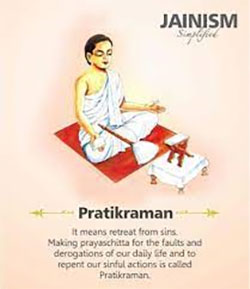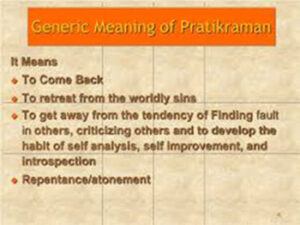What is Pratikraman?
Pratikraman is the combination of two words, ‘PRA’ – return and ‘ATIKRAMAN’ – violation. When the soul is in a state of equanimity it is in its nature (sva-bhäv) but when it is not and is acting on its passions it is in violation of its nature (vi-bhäv). Pratikraman literally means – a returning from violations, the turning back to the original Self! It is the bringing back the soul which has lost its way and become outwardly. How can one return back?
Arising of passions, for the karma bound soul, is inevitable like we understood. As a result of our attachment and aversions, we will unfailingly step out of our true natures. Pratikraman is very simply to go back (‘Prati’ – back + ‘Kraman’ – to go).
– it’s to reflect and review, to introspect and retrospect the time gone by; bringing the transgressions for personal actions committed in deeds, words and thoughts. to the conscious aware mind.
– the manifestation of remorse and repentance; to confess (älochanä) and atone for past transgressions (präyaschit) of mind, body, and speech in one’s daily activities.
– the desire for amendment, an intent to minimize these acts in the future; going back to the path of nonviolence (ahimsa), truthfulness (satya), non-stealing (achaurya), non-sensorial indulgences (brahmachärya) and non-attachment (aparigraha).
– clearing of ones conscience; forgiving the faults of others, soliciting pardon without reservation or pride from others for one’s own transgressions, and extending friendship to all.
Thus pratikraman is not only a religious ritual but self-analysis, self-improvement, self- realisation and introspection, serving to exercise control over one’s mind by prodding it to overcome its weakness and encouraging it to strive for humility, extending friendship, forgiving the faults of others and for asking forgiveness with an open heart. The ultimate aim of pratikraman is to minimize the impact of our mistakes on our lives to ensure that such mistakes are not repeated.
What do we do Pratikraman of?
Influx of karma (aashrav) happens due to 5 main reasons and thus we need to do pratikraman of those five causes.
1. Pratikraman of Mithyätva (wrong belief) – there are 25 types of wrong perceptions.
2. Pratikraman of Avrat (avowal/non-restraint) – the state of un-controlled, un-restrained desires.
3. Pratikraman of Pramäd (laziness) – indolence, negligence and unawareness in the activity of Dharma).
4. Pratikraman of Kashäya (passions) – All forms of anger, pride, deceit and greed.
5. Pratikraman of Ashubh/Aprashasta Yog – (inauspicious activities of body, speech and mind).
To accept right belief after having given up the wrong one, to achieve self-restraint after having shunned non-restraint, to become spiritually vigilant after having abandoned lethargy, to cultivate good qualities like perseverance after having renounced passions and to attain the true nature of soul after having given up worldly activities is Pratikraman.
In addition, Pratikraman is the spiritual activity when one remembers all the excesses/ faults/ transgressions of one’s vows and atones for them. The Jain ethics system outlines 12 vows of limited nature (12 shrävak vrat) to be practiced by the lay people that are less intense than those followed by monks and nuns who have totally renounced worldly life. A Jaina strives to adopt these vows according to one’s individual capacity and circumstances. The ultimate goal is to accept them as full vows. During Pratikraman, one would contemplate on each of these vows, repent and ask for forgiveness for one’s past minor transgressions that may have occurred knowingly or unknowingly and also so that one would be more aware of such circumstances and would avoid such transgressions in the future.
How to do Pratikraman?
If one only performs the Pratikraman ritual through bodily and verbal acts, and just verbally confesses the past sinful acts and makes open declaration not to commit them in future, but in real life one continues to commit sinful activities without any hesitation, then this type of recitation of ritual is called Dravya or external Pratikraman.
The Dravya Pratikraman is not useful, but on the contrarily it is harmful. It deceives one own self and it meant simply to deceive others. If after the performance of Pratikraman ritual, one minimizes or eliminates the sinful activities in real life then the Pratikraman is called Bhäv or internal Pratikraman, which is very useful for the purification of the soul.
The external (clothes, ritualistic actions, not-understood recitals) is not regarded as of much consequence since what is important is internal purity.
When do we do Pratikraman?
In its original sense a pratikraman must be done when an atikraman happens; meaning – transgressions happen, and atonement must follow. However in the times we live in, we are not able to remain so mindful and hence, the wise have advised five types of pratikraman (Ävashyaka Sutra); mainly based on the period of time to which the confession refers:
1. DEVASIYA pratikraman which is performed in the evening to reflect on the transgression of vows (wrongdoing) done during that day.
2. RÄIYA pratikraman which is performed at the onset of sunrise to reflect on the transgression of vows (wrongdoing) done at night.
3. PÄKKHI/PAKSIKÄ pratikraman which is performed on the 14th day of every fortnight to reflect on the transgression of vows (wrongdoing) done during the paksa or half-month.
4. CHAUMASI pratikraman which is performed every four months (on the evening of full moon of Ashadh, Kartik and Phägan month based on lunar calendar) to reflect on the transgression of vows (wrongdoing) done during the last four months.
5. SAMVATSARI pratikraman which is performed once a year at the end of the Paryushan festival to reflect on the transgression of vows (wrongdoing) done during that day. Interestingly, the words “Paryushan” means “to stay near”, and “Pratikraman” means “going back” both referring to the soul (atma) and the focus in taking it back to its original virtues, which are compassion, peace, equanimity, forgiveness, etc., and keeping it there.
Periodic cleansing of the soul – mindful awareness, repentance and atonement is essential to avoid karmas becoming ‘stickier’ and hence more difficult to shed.
As an analogy consider: A person who takes a bath twice a day is considered cleaner than a person who bathes once a day, who is cleaner than the one who takes a bath every fortnight, who is cleaner than a person who bathes every four months, who is much cleaner than someone who bathes only once a year.
Acknowledgement:
https://jainstudy.wordpress.com/2017/10/04/pratikraman/



Compliments for bringing out correct aspects of pratikraman.
Just to add some useful understandings to one already highlighted
1. Kraman is normal vyvahar or dealings of mind, speech,body where there is no visham bhav , no one is hurt, no Kashays involved for which one may not need cleansing or prstikraman
2. However as said we will have many Atikramans during the day wherein some one may be hurt by our mind,speech, body, there are kashay Bhav , negative opinions, lustful or passionate perversions . They need immediate cleansing .
As soon as Atikramans happen, it robs our own inner happiness, harmony and equanimity. Our mistakes do bug us and are burden on our own self .
If not cleaned , this inner disturbance lasts long .
Moreover, karmic particles will stick on soul .
Cleansing involves three elements- Aalochana( confession), pratikraman- to turn back ( apology) and pratyakhyan( resolve and asking for inner strength not to repeat it)
Ideally it should be done immediately or as soon as possible within our heart keeping presence of lord and also asking for forgiveness from pure soul of person with whom Atikraman has happened.
As we do it , first our own guilt burden is relieved, our own inner happiness, harmony or equanimity is regained .
Also karmic particles get cleaned.
Our vibrations also reach to affected person and his/her mind may be cleaned. At least animosity may be averted .
Thus it is the greatest and avashyak tool of vitrag science.
Important is Atikraman or mistake should be realized and pratikraman or cleansing done for that mistake and with that person to be effective.
As rightly said , Bhav pratikraman is the key .
( In very presence of Lord Mahavir , I bow to pure self , who is free of mind,speech,body, name and name related attachments of ——-(name of person hurt by us) and all karmic bonds . I confess my mistake or misdeed , ask for forgiveness and decide not to do such mistake again. Please give me inner strength.)
Going deeper , having Mithya Drashti or wrong belief in itself is Atikraman.
Not knowing our true self as pure soul and living as one with mind,speech,body as mine due to mithyatwa itself is root cause of all Atikramans.
Hence our earnest prayer should be to know our true self and have samyak Drashti or right vision .
With correct simple understanding and application or use it can work wonders .
With appreciation for bringing out true meaning of pratikraman and apology if any of above expressions are hurtful or non pluralistic .
Can you be more specific about the content of your article? After reading it, I still have some doubts. Hope you can help me.